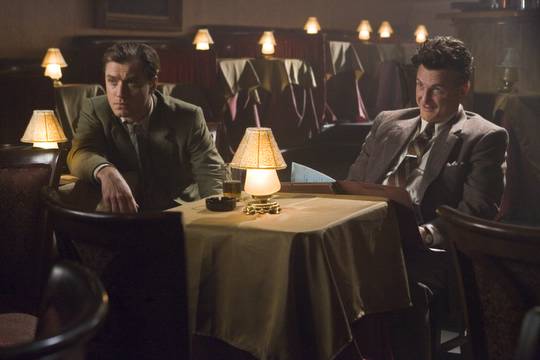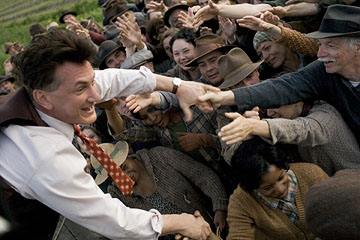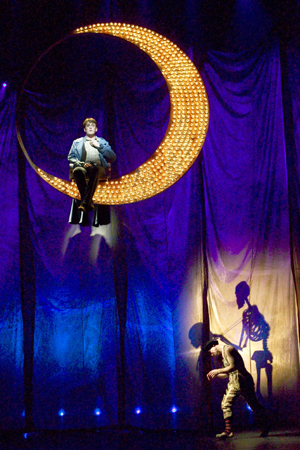By way of Ed Rants, Sci-Fi and executive producer George Clooney are collaborating on a 6-hour TV version of Neal Stephenson’s Diamond Age. Not the most approachable of Stephenson‘s books offhand, so I’ll be curious to see what they do with it.
Category: Arts and Letters
The Shiftless Plagiarist.
“These examples help bring a crucial issue of plagiarism into focus. Behind the talk of originality lurks another preoccupation, less plainly voiced: a concern about the just distribution of labor.” After reading Richard Posner’s Little Book of Plagiarism, Slate‘s Meghan O’Rourke ruminates on the ethics of stealing someone’s words. (Also seen at — shamelessly plagiarized from? — The Late Adopter.)
Hallows Be Thy Name.
Old news now, but it happened while on the track: Harry Potter’s final chapter gets a title: Harry Potter and the Deathly Hallows.
No Dubya Left Behind.
“But if the list is for real, it’s evidence of presidential dereliction of duty, and perhaps an outright threat to national security. Two books a week is an uphill battle for a graduate student whose responsibilities don’t even include showering. For a president, who lives at work, reading and comprehending two serious books a month takes a Herculean effort.” (Hey, I shower!…um, most days.) Slate‘s Bruce Reed discusses Dubya’s newfound love for books, suggesting that his recent reading contest with Karl Rove is part of the reason why things have gone so astray of late for this president. Well, call me old-fashioned, but — My Pet Goat notwithstanding — I’d usually rather see Dubya with his nose in a good book than see him make any more lousy world-threatening decisions. Besides. Dubya dug himself in this hole long before 2006…some healthy book learnin’ might’ve done him right earlier in his tenure. Hey, at the very least, he might’ve locked down that whole pesky Shia-Sunni thing.
Ethan elocutes.
“Not to be crass, but Ethan Stiefel, the American Ballet Theatre principal who starred in the film Center Stage, has had a shitty year.” Time Out: New York publishes an extended interview with my sister’s boyfriend, Ethan. Which reminds me: ABT’s City Center season is now in full swing, so get your tickets while you can. (I’ll be going several times over the next few weeks.)
Going to the carnival.
So, my sister, her boyfriend, and I went to check out The Times They Are A-Changin’, the new Twyla Tharp-choreographed reimagining of famous Bob Dylan songs, last Thursday (with, as a star-gazing aside, some heavy-hitters in attendance: Annie Leibowitz sat directly in front of me, and Tharp herself sat directly behind. Yes, I’m a celebrity hound.) And the verdict? Well, first let me say, that — some early dabbling in community-theater notwithstanding — I’m really not much of a musical guy. I tend to find the American Idol-ish histrionics of Broadway singing really distracting, and particularly when the song in question is something like “Masters of War.” Nor have I seen Moving Out, Mamma Mia!, Ring of Fire, Almost Heaven or any of the other “Broadway Karaoke” shows that currently seem to be the rage, so I can’t really compare it to any of the others — I was really more interested to see some intriguing interpretations of Dylan than I was to partake in a group sing-a-long (which, thankfully, Times is not.) With all that said, I found Times to be…kinda hit-or-miss. While some of the visions here do their source material justice in memorable fashion, others fall flat or just seem ill-conceived. And, while the circus acrobatics on display are amazingly well-performed and at times mesmerizing, too many numbers slip into the same dark carnival-of-the-absurd pattern. The cast works hard, but surely, when you get down to it, there is more to Dylan’s oeuvre than just aggro carny folk.
To its credit, Times samples songs from across Dylan’s career, from the hoary (“The Times They-Are A Changin’,” “Blowing in the Wind“) to the obscure (“Man Gave Names to All the Animals,” “Please, Mrs. Henry“), through the lean years (“I Believe in You,” “Dignity“) and up to the recent critical revival (“Not Dark Yet,” “Summer Days.”) Set in a traveling circus run by the vicious, heavy-handed Captain Ahrab (Thom Sesma) — a character from one of Dylan’s great American fables,”Bob Dylan’s 115th Dream,” not included — the play basically centers around a love triangle among Ahrab, his son Coyote (Michael Arden), and the lady Cleo (Lisa Brescia), one of the circus performers. Through their story — and the larger tale of a power struggle over the circus — are refracted these thirty or so Dylan tunes, strung togther in haphazard but decently compelling fashion.
I’d like to say there’s a formula for when a song works and when it doesn’t, but it doesn’t go over like that. One of the two best numbers, “Simple Twist of Fate” (the only cut from Blood on the Tracks here), is played basically straight. Alone in spotlight, Ahrab sings wistfully in the foreground (as seen at left) while the younger couple cavorts behind him, a haunting memory. “He woke up, the room was bare. He didn’t see her anywhere. He told himself he didn’t care, pushed the window open wide. Felt an emptiness inside, to which he just could not relate.” The bleak, melancholic staging matches the song perfectly, and Ahrab/Sesma channels both its poetry and its pain.
But, in the other most successful number, “Mr. Tambourine Man” (a song I can usually take or leave), Tharp & co. have taken a tune that’s ostensibly about a drug deal and just ran with it. Now, it’s a gripping, Bergmanesque dance of death, with one of the sadder clowns (Charlie Neshyba-Hodges) holding center stage as the ensemble circles around him in black, recalling the doomed pilgrims of The Seventh Seal. Obviously, Tharp isn’t the first to read “Tambourine Man” as a disquisition on mortality. (“I’m ready to go anywhere, I’m ready for to fade…into my own parade, cast your dancing spell my way, I promise to go under it.“) Nevertheless, the staging both feels innovative and cuts close to the bone of the song in surprising fashion.
There are other good moments scattered throughout the show, although few that hold their power over the course of an entire track: For example, a contortionist writhes horribly on a hospital bed during the “Dr. Filth” passage of “Desolation Row,” flashlights whirl and twirl (held by people brandishing them vaguely like tusken raiders) during “Knocking on Heaven’s Door“, the cast memorably get their drink on for “Please, Mrs. Henry,” and one clown reenacts Dylan’s “Subterranean” signage during the latter half of “Like a Rolling Stone.”
But, when a song’s off, it’s pretty off. The most obvious offenders are “The Times They Are A-Changin’,” “Blowing in the Wind,” and arguably “Lay, Lady, Lay,” all of which are performed in a deadly earnest Broadway patter that just stop the show dead. (This is particularly unfortunate in the case of the first one, since that’s how the show begins.) But, there are other problems. The bizarre welcome-to-the-carnival-of-beasties routine works well for “Desolation Row” (since, after all, “The circus is in town“) and maybe even for other rousing numbers such as “Like a Rolling Stone.” But, it’s overdone — in “Highway 61 Revisited,” “Everything is Broken,” “Gotta Serve Somebody,” “Rainy Day Women #12 & 35” — to the point that the musical numbers become indistinguishable. (“Masters of War” also falls somewhat into this pattern — I liked it better than most, but was reminded more of ABT’s splendid recent revival of “The Green Table,” which captured the same sentiment better.)
And, sometimes, in my humble opinion, the attempted interpretation falls flat on its face. I thought turning “Not Dark Yet,” Dylan’s gloomy but resigned rumination on death around the corner, into a rage-against-the-dying-of-the-light completely misses the point of the song, which is that he’s given up and given in to the coming darkness. (“I’ve been down on the bottom of a world full of lies. I ain’t looking for nothing in anyone’s eyes.“)
Most egregious in this regard is what’s been done to “Don’t Think Twice, It’s Alright.” Perhaps because it remains such a personal song — a song about two people rather than a generation — I’d say it’s aged much better than almost all of the other hugely popular early-Dylan standards (“Blowing in the Wind,” “The Times They Are A-Changin’,” “A Hard Rain’s A-Gonna Fall.”) In fact, I might go so far as to say that “Don’t Think Twice” may just be the quintessential Dylan break-up song in a career full of them (although now that I write that…Blonde on Blonde, Blood on the Tracks…ok, never mind. That’s too bold a statement.) At any rate, here, all the complexity of competing emotions that drives the track — “I ain’t sayin’ you treated me unkind, you could have done better but I don’t mind, you just kinda wasted my precious time” — is wasted, as it’s become, inexplicably, a number sung by a woman to her overly eager dog. (Although I will concede that the canine in question — I believe it was Jason McDole — was convincingly and creepily Berkeley-like.)
In sum, A Times They Are A-Changin’ is at times engaging, and may be worth catching if you have a hankering for the carnivalesque, if you’re a Dylan completist, or if you have a higher tolerance for showtune renditions than I do. But, as an exploration of Dylanalia, I found the show too narrowly circumscribed within its three-ring circus, and ultimately unsatisfying. (Then again, in the play’s defense, I didn’t think much of Masked and Anonymous either, so perhaps I’m just ornery about such things.)
Beast of Burden.

Unfortunately, the reviews of Stephen Zaillan’s All the King’s Men, the second half of my Friday morning double-feature, are basically correct. The film just doesn’t work…Indeed, it’s even a bit of a stinker. I’ve never seen the 1949 John Ireland/Broderick Crawford version, so I can’t tell you how it compares to that particular Oscar-winner. But, a few ghostly wisps of Penn Warren’s prose notwithstanding, this 2006 take on the novel is, as I feared in a post one year ago today, both hopelessly miscast and remarkably pedestrian. Straining mightily for solemnity throughout its run, this Men feels leaden from the start and fails to capture the sprawling grandeur of the novel (which, I guess, some literary critics hate. I for one love the book — it’s one of my all-time favorites, and not just for the failed historian digression.) If you’ve never read All the King’s Men, trust me — you’ll want to stay away from this flick. (If you have, well, you probably want to stay away too.)
Loosely based on the life of Louisiana’s Huey Long, All the King’s Men follows the trajectory of one Willie Stark (Sean Penn, way off), an earthy and ambitious backcountry politician with big city hungers and national dreams. (Consider him the Tommy Carcetti of his day.) In the midst of running a doomed gubernatorial campaign — designed by political insiders Tiny Duffy (James Gandolfini) and Sadie Burke (Patricia Clarkson) to split the hick vote and thus elect the favored candidate of the powers-that-be — Starr finds his populist voice and manages to capture the State House on a platform of less corporate graft and more roads, schools, and libraries for the people. But, once in office, the lure of power aggravates Stark’s more misanthropic tendencies, and (though this film barely explains how) the new governor begins to enact his redistributive policies with increasingly little regard for democratic niceties.
Along for the ride is our embittered narrator, Jack Burden (Jude Law, also way off but, surprisingly, closer to the mark than Penn). A slumming scion of Louisiana’s elite turned disaffected journalist (and functioning alcoholic), Burden, who relishes playing the world-weary observer, becomes Stark’s right-hand man despite himself. But, involvement, like, power, carries its own price. Soon, to accommodate Stark’s growing political appetites, Burden finds he must not only reenter but betray the past he thought he’d earlier burned away, whether it be by digging up dirt on his magisterial godfather, Judge Irwin (Anthony Hopkins, on autopilot), convincing his best friend (Mark Ruffalo, zombielike) to sign up under Stark’s employ, or allowing his youthful sweetheart (Kate Winslet, strangely bad) to herself come under Stark’s thrall.
To the film’s credit, the movie attempts to spend as much time on Burden’s arc as it does on Stark’s, as it should. But the two halves of the tale seem almost wholly separate here — Stark disappears for the middle third, when Burden’s backstory takes center stage. And that’s just the start of what’s wrong here — Simply put, everything just seems off. Penn is wholly unbelievable (and virtually inscrutable) as Stark, Law doesn’t serve much better as Burden. Other actors (Hopkins, Ruffalo) seem bored, others still (Gandolfini, Clarkson) are given too little to do. Accents are consistently mangled throughout. James Horner’s score is intrusive to say the least. Plot details are consistently elided over to the point of the story barely making sense (Why, for example, is Stark being impeached? One gets no clue in this version.) And Zaillan’s hamhanded directing stops the movie dead all too many times (the most egregious case being in the final moments, with the Louisiana seal — you’ll see what I mean.) Even the period is off: The novel takes place during the Depression, but for reasons that never become apparent we begin our tale here in 1954. If it ain’t broke, people…
The sole redeeming grace of this version of All the King’s Men are the occasional literary flourishes from the book, which are usually given by Jude Law in voiceover. Only in these brief moments, and only imperfectly, can we sense the endless jiggers of whiskey, the cedary scent of spanish moss, the lingering sweat and grinding despair that characterize Penn Warren’s novel. Whether it be Willie’s path to power or Jack’s remembrances, All the King’s Men is about more than just a political rise and fall. As befitting its author’s role in the southern agrarian literary movement, curdling at the novel’s heart is a lament for the days of yore and a futile raging against the inexorable indignities of time. The past passes: It marks us forever and can neither be escaped nor reclaimed as it was — it can only be confronted and accepted. “Man is conceived in sin and born in corruption and he passeth from the stink of the didie to the stench of the shroud.” Zaillan’s film version does make a meaningful attempt to capture these crucial elements of the book, but, alas, like Willie himself, its reach far exceeds its grasp.

Children of Men, Elves, and Dwarves.
By way of a former member of the program here, Christopher Tolkien announces that, after thirty years of work, he’s completed and is publishing an unfinished 1918 J.R.R. Tolkien manuscript entitled The Children of Hurin.
The Strength of Collective Man.
“When you look at this tower, it will immediately tell you where the memorial park is. It’s always pointing.” Architects and developers reveal the rest of the proposed Lower Manhattan skyline at Ground Zero, to accompany the Freedom Tower.
Trailer Convoy.
Several items for the trailer bin:
* Diane Lane and Thomas Jane go on the lam to escape hitmen Mickey Rourke and Joseph Gordon-Leavitt in this glimpse at John Madden’s Tarantino’ed-up version of Elmore Leonard’s Killshot. (Johnny Knoxville and Rosario Dawson are involved in some fashion as well.)
* Chow Yun-Fat and Gong Li gear up for some trademark Zhang Yimou wire-fu (a la Hero and House of Flying Daggers) in the new teaser for Curse of the Golden Flower.
* Nicole Kidman ventures through the photographic looking-glass as Diane Arbus in Fur: An Imaginary Portrait of Diane Arbus, the new film by Secretary‘s Steven Shainberg, also with Robert Downey Jr. (Mirrored here.)
* Helen Mirren jumps from Elizabeth I to Elizabeth II in this look at Stephen Frears’ The Queen, concerning Buckingham Palace’s reaction to the death of Princess Diana. (I have zero interest in the subject matter, frankly, but I do like Mirren, Frears, and James Cromwell, and there’s an iffy Tony Blair impression here by Michael Sheen, to say nothing of the guy playing Prince Charles.)
* Finally, Guillermo del Toro returns to the faerie Spain of The Devil’s Backbone in this rapid-edit teaser for Pan’s Labyrinth. (Being on a lousy hotel connection, I couldn’t get this link to work, but I believe the same teaser is mirrored here.)




